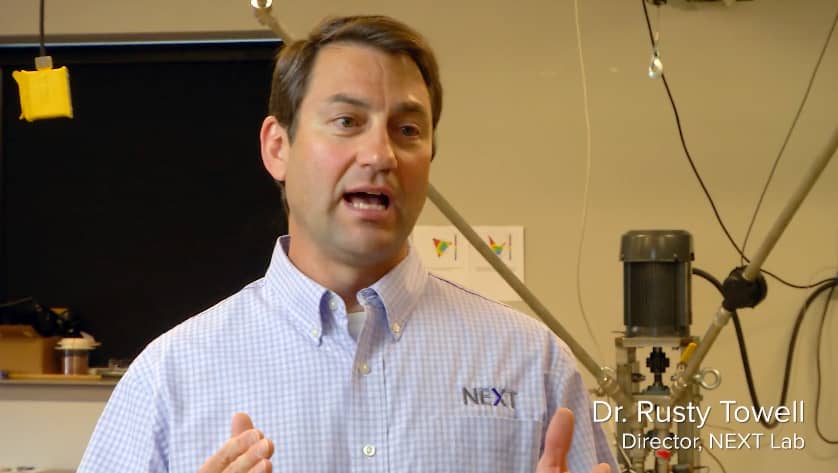
Remember the adage “Don’t judge a book by its cover” when meeting Dr. Rusty Towell (’90) for the first time.
More to the point, don’t pre-judge Towell based on the cover of his scholarly books, publications and presentations. Don’t let titles like “Recent Measurements With the NIFFTE Fission TPC and the Potential to Advance Thorium Fueled Reactors” trick you into thinking Towell is unapproachable.
Instead, move on to “Why Making Energy From Dirt Might Save the World.” That down-to-earth title is a better fit. Actually, both titles accurately fit Towell, a professor in ACU’s Department of Engineering and Physics who holds a bachelor’s degree from Abilene Christian University and a doctorate in physics from the University of Texas.
He is brilliant enough to have presented a paper, the one with the thorium reference, at the Nuclear Science Symposium in Seattle. He also is accessible enough to talk about making energy from dirt, more specifically from thorium, which is found in dirt.
“It’s a cheap energy source,” Towell said.
“Towell is at ease explaining the essence of the work in the lab, using familiar items like table salt and a Crock-Pot to describe the mysteries of the lab. But he is just as comfortable at science conferences discussing his areas of expertise – nuclear reactors, nuclear physics, energy and environment, and particle detector development – with fellow scientists.”
Both those impressions of Towell are accurate – brilliant scholar and down-to-earth teacher who explains the mysterious world of physics in everyday language that most people can understand.
Towell, a member of the ACU faculty for 21 years and a former department chair, is director of ACU’s Nuclear Energy eXperimental Testing (NEXT) Lab.
Towell is at ease explaining the essence of the work in the lab, using familiar items like table salt and a Crock-Pot to describe the mysteries of the lab. But he is just as comfortable at science conferences discussing his areas of expertise – nuclear reactors, nuclear physics, energy and environment, and particle detector development – with fellow scientists.
Scientist that he is, Towell is a teacher above all. He talks about his students with pride, noting that ACU routinely sends its undergraduate physics students to national laboratories to conduct research alongside world renowned scientists. He likes to note that in a room full of 500 scientists in those labs, only four or five will be undergraduate students.
“And they’re all from ACU,” he says with obvious pride.
One of the reasons Towell is excited about “making energy from dirt” is that finding a source of inexpensive energy is one of the major challenges facing the world today. And solving those kinds of challenges plays into the university’s mission, which is to educate students for Christian service and leadership throughout the world.
Helping solve the world’s energy problems would certainly fall under the umbrella of that mission statement. ACU started its NEXT Lab as a way to research “real world problems,” Towell said and to find solutions to those problems.
Getting students involved in hands-on research in NEXT Lab continues to be an emphasis that ACU has long had with its physics students, Towell said, a distinctive of the undergraduate program.
“It is something that’s really set us apart for decades,” Towell said.
Students and faculty are working to discover energy that is less expensive and safer, water that is pure and abundant, and medical isotopes used to diagnose and treat cancer. LEARN MORE
